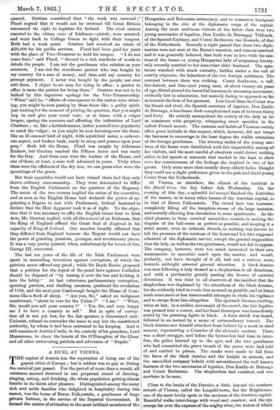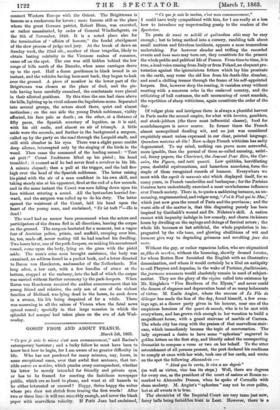A DUEL AT VIENNA.
THE capital of Austria has the reputation of being one of the gayest cities of Europe ; but it seldom was so gay as during the carnival just passed. For the period of more than a month, all existence seemed drowned in one perpetual round of dancing, singing, eating, and drinking, the whole population getting almost frantic in its thirst after pleasure. Distinguished among the many rich and noble families who delighted in hospitality during this season, was the house of Baron Falkenstein, a gentleman of large private fortune, in the service of the Imperial Government. It formed the centre of attraction to the most brilliant members of the Hungarian and Bohemian aristocracy, and to numerous foreigners belonging to the elite of the diplomatic corps of the capital. Among the most assiduous visitors of the latter class were two young secretaries of legation, Don Emilio de Muruagay Vildosola, of the Spanish Embassy, and Count Rechteren van Rosande, of that of the Netherlands. Scarcely a night passed that these two diplo- matists were not seen at the Baron's mansion, and rumour asserted, and it was generally believed, that both were in love with the mis- tress of the house—a young Hungarian lady of surpassing beauty, only recently married to her somewhat older husband. The spec- tators watched with much curiosity, hidden under a due veil of courtly etiquette, the behaviour of the two foreign noblemen. The contrast between them was striking. Count ltechteren, a tall, fair-haired, and blue-eyed young man, of about twenty-six years of age, flitted around the beautiful baroness in unceasing movement, evidently lost in admiration, but scarcely daring to approach so far as totouch the hem of her garment. Less timid than the Count was his friend and rival, the Spanish secretary of legation, Don 'Emilio de Muruaga., a handsome dark-complexioned man of between thirty and forty. He entirely monopolized the society of the lady as far as consistent with propriety, whispering sweet speeches in the softest French accent. The customs and habits of Viennese society allow great latitude in this respect, which, however, did not tempt the baroness to encourage in the least degree the visible attentions of the foreign gentleman. The winning smiles of the young mis- tress of the house were distributed with fair impartiality among all her visitors, and the most careful of observers could detect nothing either in her speech or manners that tended in the least to show even her consciousness of the feelings she inspired in two of her guests. Only some more than usually sharp elderly ladies thought they could see a slight preference given to the pale and timid young Count from the Netherlands.
At Vienna, as elsewhere, the climax of the carnival is the Mardi Gras, the day before Ash Wednesday. On the evening of this day, a splendid Sal =aqui finished the festivities of the season, as in many other houses of the Austrian capital, so in that of Baron Falkenstein. The crowd here was immense, completely filling all the reception-rooms of the large mansion, and scarcely allowing free circulation in some apartments. As the chief pleasure in these carnival assemblies consists in making the disguise of the ball-room as perfect as possible, and keeping it a strict secret, even to intimate friends, so nothing was known to tell the presence of the mistress of the house and her two supposed admirers of the diplomatic service, except the general supposition that the lady, as well as the two gentlemen, would not fail to appear. The company, however, were too much interested in their own amusements to speculate much upon the matter, and would, probably, not have thought of it all, had not a curious scene towards midnight arrested general attention. A black domino was seen following a lady dressed as a shepherdess in all directions, and with a pertinacity greatly passing the licence of carnival diversions. It was clear to all observers of the incident that the shepherdess was displeased by the attentions of the black domino, for she evidently tried to evade him as much as possible, and at times made some more or less unsuccessful attempts to elude his vigilance and to escape from him altogether. The spectacle became exciting, when at last, in a sudden movement of the crowd, the fair fugitive was pressed into a corner, and her hand thereupon was immediately seized by the pursuing figure in black. A faint shriek was heard, followed in an instant by a scene of extraordinary tumult. The black domino saw himself attacked from behind by a mask in steel armour, representing a Crusader of the eleventh century. There was a short struggle, and before the bystanders had time to inter- fere, the police hurried up to the spot, and the two gentlemen who had committed the grave breach of the peace were laid hold of and carried to prison. The masks were made to fall from the faces of the black domino and the knight in armour, and the assembled company beheld with astonishment the well known features of the two secretaries of legation, Don Emilio de Muruaga and Count Rechteren. The shepherdess had vanished, and was nowhere to be seen.
Close to the banks of the Danube, a little beyond the southern suburb of Vienna, called the Leopold-town, lies the Brigittenau, one of the most lovely spots in the environs of the Austrian capital. Beautiful walks interchange with wood and meadow, and the eye sweeps far over the expanse of the mighty river, the waters of which connect Western Europe with the Orient. The Brigittenau is famous as a rendezvous for lovers ; more famous still as the place where the great German patriot, Robert Blum, was executed, or rather assassinated, by order of General Windischgratz, on the 9th of November, 1848. It is a noted place also for the termination of ' affairs of honour," the feudal abridgment of the slow process of judge and jury. At the break of dawn on Sunday week, the 22nd ult., another of these tragedies, likely to obtain lasting celebrity in the Viennese realms of romance, came off on the spot. The sun was still hidden behind the low range of hills north of the Danube, when some carriages drove up to the spot. Half a dozen gentlemen in black issued in an instant, and the vehicles having been sent back, they began to look over the ground. A piece of meadow in the lower part of the Brigittenau was chosen as the place of duel, and the pis- tols having been carefully examined, the combatants were placed in their allotted positions. By this time the sun had risen above the hills, lighting up in vivid colours the lugubrious scene. Separated into several groups, the actors stood there, quiet and almost motionless ; on the one side the young Dutch nobleman, visibly affected, his face pale as death ; on the other, at a distance of fifty paces, the Spanish secretary of legation, as it is said, with his old smile, and almost an air of triumph. A little aside were the seconds, and further in the background a surgeon, called up by the party on the road through the Leopold-stadt, and still with slumber in his eyes. There was a slight pause amidst deep silence, interrupted only by the singing of the birds in the wood. Then came the command of the leading second: "Tout eat pret !" Count I!echteren lifted up his pistol ; his hand trembled ; it seemed as if he had never fired a revolver in his life. A minute elapsed ; then a pull at the trigger, and the ball flew high over the head of the Spanish nobleman. The latter raising his pistol with the air of a man confident in his own skill, and taking steady aim at his opponent, fired at the end of a few seconds, and in the same instant the Count was seen falling down upon his face without uttering a sound. All the bystanders hurried for- ward, and the surgeon was called up to do his duty. The latter opened the waistcoat of the Count, laid his hand upon the heart of the young man, and exclaimed, " Er ist todt !"—He is dead !
The word had no sooner been pronounced when the actors and participators of the drama fled in all directions, leaving the corpse on the ground. The surgeon hesitated for a moment, but a vague fear of Austrian police, prison, and scaffold, creeping over him, he, too, made off, never resting till he had reached his dwelling. Two hours later, one of the park-keepers, on making his accustomed round, came upon the body, lying on the grass with the pistol aside. The man's cries soon brought assistance, the body was examined, an address found in a pocket book, and a letter directed to Baron von Heeckeren, ambassador of the Netherlands. Not long after, a low cart, with a few bundles of straw at the bottom, stopped at the embassy, into the hall of which the corpse was carried without further ceremony by the park-keepers. When Baron von Heeckeren received the sudden announcement that his young friend and relative, the only son of one of the richest families of Holland, was lying dead in the house, he sank down in a swoon, his lire being despaired of for a while. There was mourning in all the salons of Vienna when the fatal news spread round ; specially in that large mansion in which the splendid bal masque had taken place on the eve of Ash Wed- nesday.



























































 Previous page
Previous page